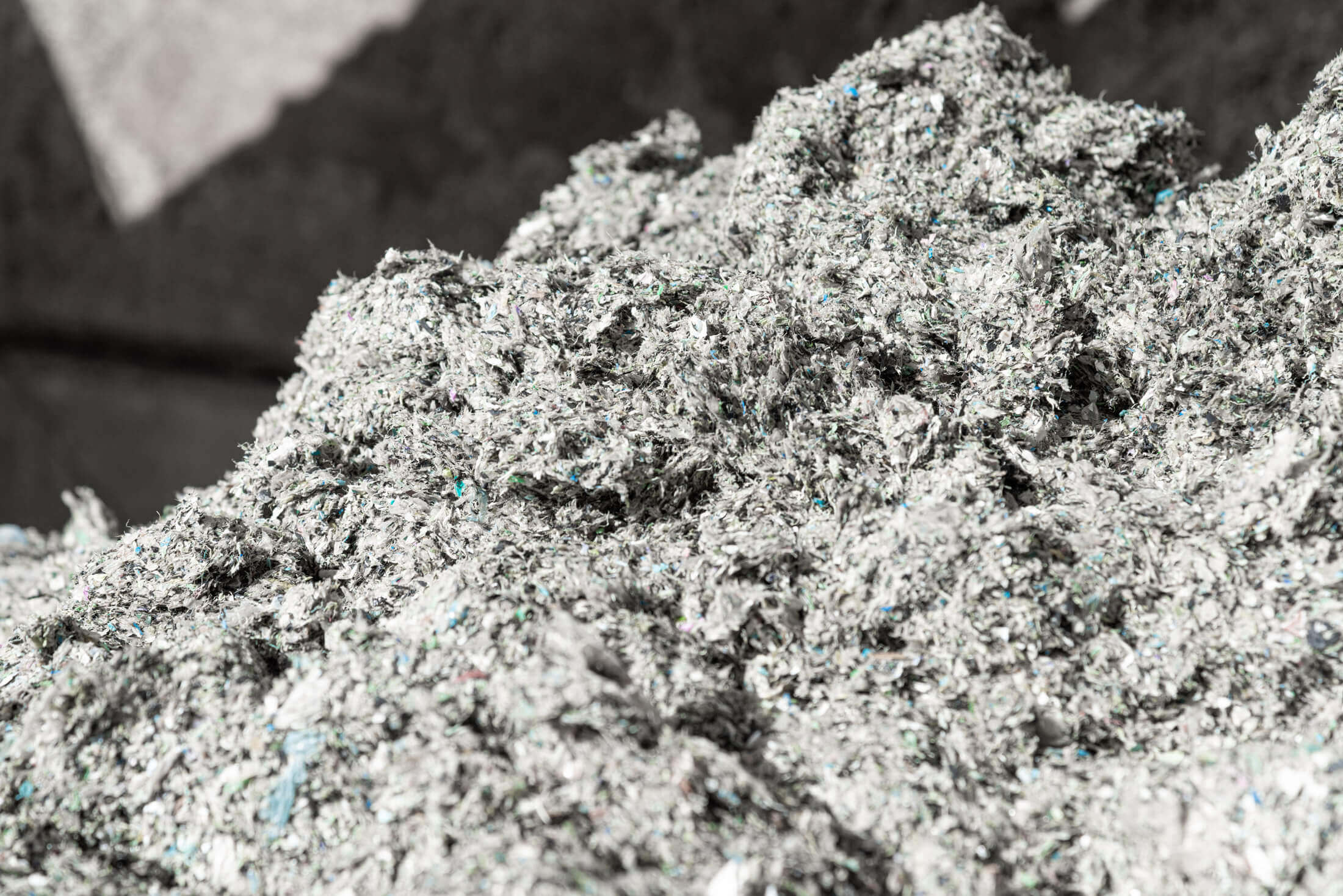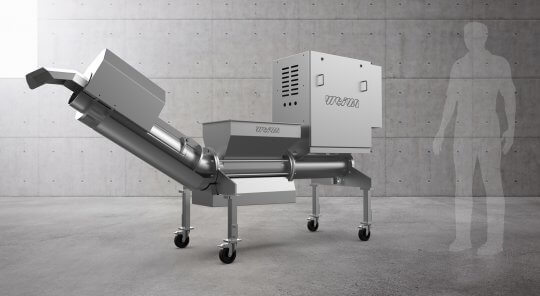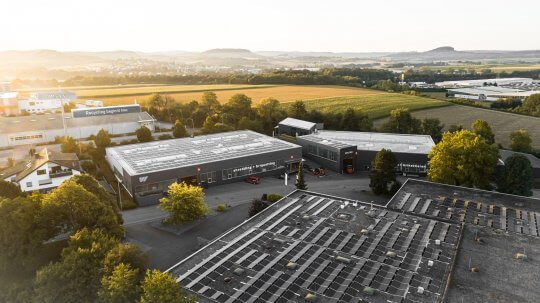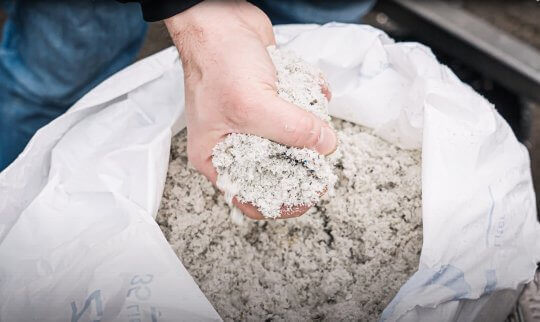
Plastic fines and washing plant rejects dewatering with WEIMA presses
Information on hydraulic presses for processing fine fractions from plastic washing systems for recycling and disposal
The efficient shredding and cleaning of plastic waste plays a central role in the plastics recycling process. However, this often results in wet fine fractions and rejects that are not suitable for further recycling processes, such as extrusion. These have to be disposed of at great expense, with the weight of this waste being a decisive factor in the disposal costs.
Dewatering the plastic waste is therefore an important step towards reducing costs, as this material stream contains an extremely high proportion of moisture. This is where the high-throughput WEIMA presses for dewatering come into play, separating the reject parts from the liquid in one efficient step. The result is highly dewatered pellets, which is a cost-effective and environmentally friendly solution for recycling companies and waste processing plants. Here we show you how you can further optimize your recycling process with WEIMA hydraulic presses.
Case study CEDO Recycling B.V. in the Netherlands
The smallest plastic particles are separated during wastewater treatment. These are fed into a WEIMA C.200 Duo dewatering press.
The particles are dewatered and pressed using hydraulic pressure to minimize disposal costs.
Dewatering fine fractions saves money.
Optimize your disposal process now.
01
170kg
Input | hour
02
€ 250
Saved disposal costs | day
03
1 year
Payback time
The recycling process at CEDO
CEDO processes post-consumer plastics at the Geleen site. This produces fine fractions from various sources: the float-sink tank, the mechanical dryer and the screening drum of the company's own wastewater treatment plant. Around 170 kilograms of plastic fines are produced every hour. These consist of around 75 percent water and are then dewatered using a WEIMA C.200 press. It runs without interruption, 24 hours a day, seven days a week. What remains are almost dry pellets.
According to CEDO, it saves a total of around 250 euros in transportation and disposal costs every day. Personnel costs amount to just under one hour per week for cleaning the machine. CEDO's investment has paid for itself within a year.

Simple and efficient draining and compressing of washing line plastic rejects
What are Washline Rejects?
In the world of plastic recycling, the washing process is an essential step in the treatment of plastic waste. This process is used to remove impurities such as dirt, oil and other deposits from the plastics. The so-called 'washline rejects' or 'fines' are a particular challenge in this process. These terms refer to materials that are separated during the washing process. Typically, these include cleaned dirt particles and various foreign substances that cannot be processed further (rejects).

Dewatering of plastic fines after washing
The effective handling and reduction of these fines is of great importance, as they are often saturated with water and can therefore significantly increase disposal costs. The aim is therefore to efficiently separate these materials from the main stream of the recycling process and the plastics recycling industry is faced with the task of continuously optimizing the washing process in order to minimize the amount of washline rejects produced.
Overall, the careful handling of washline rejects or fines plays a crucial role in the efficiency and sustainability of plastics recycling plants. It ensures that as much material as possible is returned to the cycle and the impact on the environment is minimized.
What types of plastic washing systems are there?
- Friction washer: Use mechanical friction to remove adhering dirt and impurities from the plastic flakes. Particularly effective for removing greasy or oily substances.
- Float-sink systems: Plastics are separated on the basis of their density. Lighter plastics such as polyethylene (PE) and polypropylene (PP) float, while heavier contaminants and plastics such as polyvinyl chloride (PVC) sink.
- Hot washing systems: Use hot water and detergent to loosen stubborn dirt. Particularly effective for removing adhesives, labels and other stubborn stains.
- Drum washer: Use a rotating drum in which the plastic flakes are mixed with water and, if necessary, cleaning agents. Rotation enables thorough cleaning of the surfaces.
- Centrifuges: Often used at the end of the washing process to separate water from the cleaned plastic flakes. Effective in reducing the moisture content of the flakes before the next processing step.
- Ultrasonic cleaning: Although less common, ultrasonic cleaning can be used for special applications where particularly gentle or intensive cleaning is required.
When recycling post-consumer plastics, various types of washing systems are used to remove impurities from the plastics. The selection of a suitable washing system depends on the type of plastic, the degree of contamination and the specific requirements of the recycling process.
Did you know?
In 2021, around 5.67 million tons of plastic waste was generated in Germany. Around 96% of this was post-consumer waste.
Pressing and dewatering fines from plastic washing channels in a single work step
What are the advantages of dewatering washline rejects and plastic fine fractions?
Reduce transportation and disposal costs:
The calculation is simple: every liter of water that is literally squeezed out of the plastic fine fraction with WEIMA presses reduces the weight of the waste. And as the disposal costs are significantly influenced by the weight, dewatering and compacting saves money.

Drained and compressed plastic washing line rejects
Safe water.
In the recycling process, especially in the cleaning of plastic flakes, the use of washing systems such as pre-wash systems, hot-wash systems or friction washers is essential. These processes require considerable amounts of water, which must be treated regularly.
Monitoring the lye content, which is already automated in many modern systems, also plays an important role here. To further improve the efficiency of water use, we recommend the use of our pressing machines. These make it possible to separate liquids adhering to rejects and fines and return them to the water cycle in order to keep the valuable water in the system for as long as possible.

Request your dewatering press now.
Get a quote
Advantages over screw presses
Dewatering presses from WEIMA have a particularly compact design and work with a hydraulically movable cylinder - instead of a classic transport screw. This has a decisive advantage: wear and the associated maintenance costs are reduced to a minimum. Anyone looking for a simple yet robust solution for dewatering plastic waste after the washing process will find what they are looking for with WEIMA cylinder presses.
WEIMA C.200 dewatering press for plastic fines
The WEIMA C.200 Dewatering Press is a state of the art recycling and waste management solution, specifically designed to overcome the challenges of dewatering plastic waste as well as metal shavings. This robust press is characterized by its ability to extract a large amount of liquid from plastic waste, which is particularly useful when processing washline rejects or fines.

WEIMA C.200 press | stainless steel version
Duo version for even more throughput.
WEIMA offers optional machines in a duo design for particularly large quantities of residual material. In this case, two WEIMA presses are combined with each other. Both units work independently. This significantly increases the throughput rate. Filling is also easier as the compaction chamber is larger.

WEIMA C.200 press in the Duo version
Various filling options
C.200 presses can be filled continuously via a transport screw, and batch feeding is also possible. A separate screw system with feed hopper can also be implemented.

WEIMA drainage press with screw feeding system
Facts.
Around 30 million tons of plastic post-consumer waste was collected in the EU in 2021, but only around 10 million tons of this was actually recycled.
Only at WEIMA.
Heavy duty machine designs
for long service life
Easy maintenance
for minimal down times
Various drive options
for maximum throughput
Fast service and support
for highest customer satisfaction
Everything from one source
machines, conveying technology, metal detection, support, spare and wear parts for customized solutions

WEIMA headquarters Ilsfeld (Germany)
Convince yourself.
The WEIMA showroom is equipped with shredding and compacting machines of all sizes and technologies. This allows us to simulate your application as realistically as possible. You have the possibility to send us your material or to visit us directly in Ilsfeld. From our gallery you have the best view directly into the cutting room. This allows you to observe the shredding process live.
Request appointment now
Alternatively, you can send us material for testing. Click here for the form.

Try before you buy – Material testing at our showrooms








